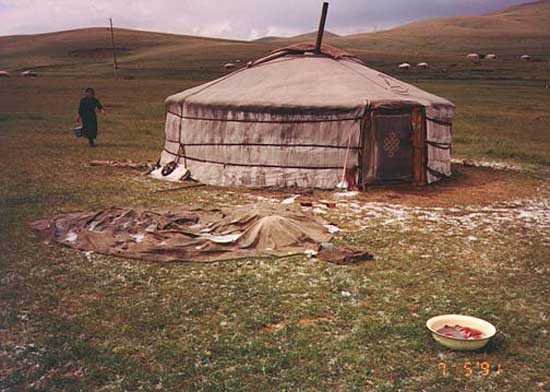
Nikita Desai is spending two years in Mongolia with the Peace Corps
Volunteer offers a mix of cultures to Mongolia
Dec 10, 2003 - Record, Northern New Jersey
Author(s): Charles Austin, Staff Writer
Nikita Desai, 23, a 1997 graduate of Fair Lawn High School, is spending two years in Mongolia with the Peace Corps. She is a graduate of Rutgers University with a major in English and worked as a paralegal for two years before becoming one of 7,500 Peace Corps volunteers. She has a passion for American and Indian dance and is bringing both to Yeroo, a small village in the Mongolian province of Selenge. For this interview, she traveled from Yeroo to Darhan, in the northern part of Mongolia, to use another volunteer's cellphone.
Q. What do you do in Mongolia?
I am an English teacher in a 10-year secondary school. I teach from 100 to 150 students every week, from fifth to eighth grade.
Q. When did you arrive and how long will you be there?
I arrived June 6 of this year, and will stay for two years.
Q. Why did you enter the Peace Corps?
I was born in India and lived there for 10 years before my family moved to New Jersey. On a visit to India in 1996 I found myself at a point where I wanted to give back to a developing community like the one I grew up in. So I applied to the Peace Corps after graduating from Rutgers.
Q. What is teaching in Mongolia like?
The kids at my school are very interested in English and in everything American. When I first got to the school, we gave the fifth-graders the option of learning Russian or English, and 90 percent wanted to learn English. They love American music, and they want to know our songs. They want to understand the English movies.
Q. What else do you do?
The kids are also interested in dance - Indian dance and hip-hop - so I teach dance and they get a little bit of Western and Eastern culture. Over the summer I am going to develop a tourism project or an environmental project of some kind. I'm doing the research for that now.
Q. What kind of place do you live in?
People in my community live in wooden houses. The houses are in a fenced-in area called a haasha; and I live with the family of the chief of police in our town. We don't have any running water, so we draw water from a well. We have electricity, which is quite fortunate, but we must use a wood stove for heat.
Q. What's the best part of your work?
I really like working with the kids, because they are so enthusiastic and energetic. They are very hardworking and interested. And I love teaching dance, because that is my passion. To be able to share these parts of both my Indian and American culture is very important to me.
Q. What are the hard parts?
It is a developing society, and I struggle with the school system. There may be no set schedules, and things change very often. And day-to-day life is hard. It's starting to get really cold now, and it takes a lot of work to maintain the day-to-day things like getting water and keeping the house warm. I have to light a fire about three times a day. And when you are alone at your site, you miss your family and friends a lot.
Q. What has surprised you?
I didn't expect the kind of warm hospitality I received. I was very scared because I'm a vegetarian, and the Mongolians are animal herders, but my family situation is very hospitable. I think my assimilation into Mongolian society was 10 times easier than my assimilation into American society. It is getting very cold now, and all my Mongolian and haasha friends are worried about keeping me warm. They really take good care of me.
Q. What are you going to do next?
I really want to go to graduate school in a master's program in international relations or development. Before I left home, a lot of my friends said I would be a really good businesswoman, so I'm looking into that.
Q. You are teaching English, but you must need to speak Mongolian. Is that hard?
When I first came, I lived with a family for 2 1/2 months to learn the language. I learned the basic verbs and tenses. I'm learning more every day, and now I feel comfortable enough to express myself and my opinions.
* * *
E-mail: austin@northjersey.com
